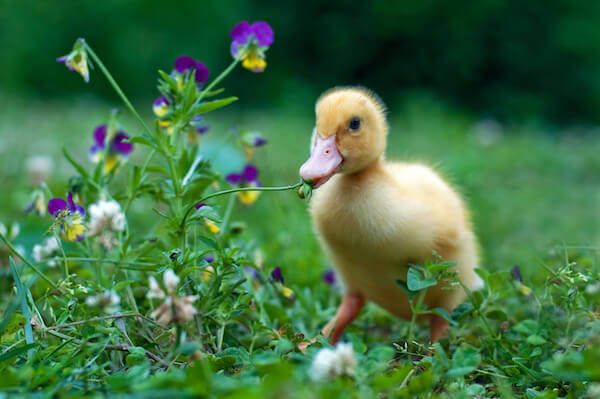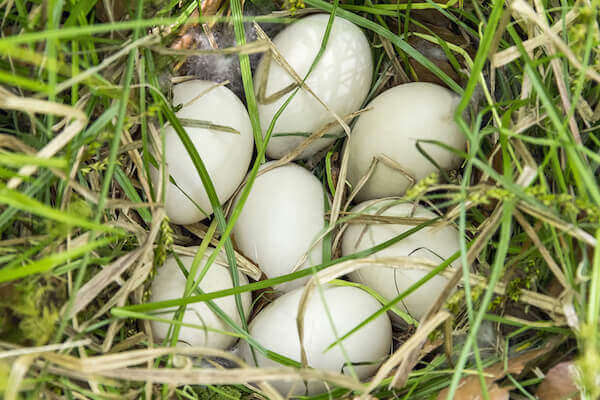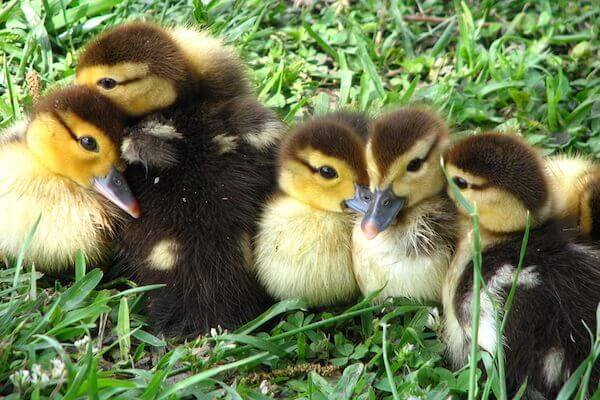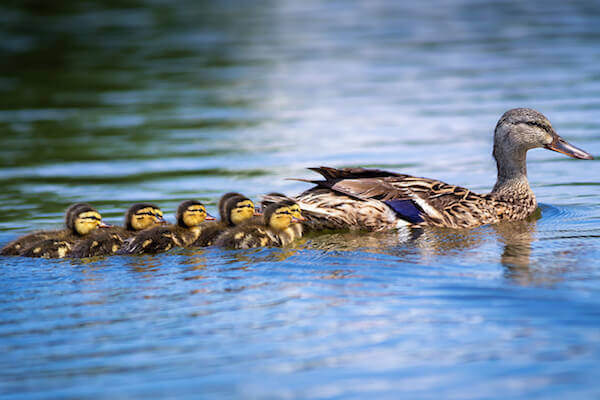
Caring for Eggs and Hatchlings When a Momma Duck is Present
The first thing you will notice when a mother hen is ready to lay a clutch of eggs is that she will begin nesting in a particular spot, whether it be in a nesting box or somewhere else, and will become quite aggressive when approached and refuse to move. It is very important that the nest and brooding mother not be disturbed unnecessarily by curious children or pets. Depending on the specific breed of duck, a hen can lay one egg per day and can end up with a clutch of about a dozen eggs.
These eggs can take anywhere from 25 to 29 days to hatch, with some certain breeds taking as long as 35 days.
In a lot of cases, the mother duck instinctively knows what to do in regards to her eggs and new hatchlings, but sometimes a caregiver will have to step in for instances where a mother duck is scared off from her nest by a predator or even killed, or if she simply gives up after a short time and is considered a “bad momma”. Mother ducks will wander off from the nest and eggs from time to time to eat, swim, or stretch her wings, but this is perfectly normal behavior and should not cause alarm.
- Once the eggs begin hatching, it is advisable to separate the mother from the father duck as drakes will sometimes attack and kill the hatchlings.
- After the first egg hatches, the rest will follow most often within the next 24 to 48 hours.
- If the eggs are not hatched within the allotted time, they most often did not make it.
- A mother duck will often kick bad eggs out of the nest or abandon the remaining unhatched eggs.
- When the hatchlings are born, do not pick up and handle them right away as they are very fragile at this stage and spend the first day beneath their mother to keep warm and for the water-resistant oil on her feathers.
A hatchling can swim at a week old, and this oil is to help protect them from becoming waterlogged and drowning. It is also a good idea to put out some starter crumble in a flat bowl and some fresh, clean water next to it for both mom and hatchlings.
Further Reading
General Duck CareTreating Sick Ducks
Caring for Abandoned Eggs
Whether in the wild or in captivity, there are times when a mother duck will abandon her nest for a variety of reasons. In this case, a caregiver can step in and, as long as the eggs are still warm, there’s still a chance they can be hatched.
- It is important to have the eggs as clean as possible without washing them due to chances of bacteria spreading in the warm, humid incubator environment.
- The incubator should be set up about 24 hours at 99.5° F prior to setting the eggs to allow the temperature to stabilize.
- It is a good idea to mark the eggs for turning purposes, and after the first 12 hours in the incubator begin turning three times a day.Turning the eggs prevents the embryo from sticking inside the shell.
- The humidity level in the incubator should be between 50-55%
- After the first week some caregivers recommend misting the eggs with lukewarm water on a daily basis.
- This is thought to mimic a mother returning wet to sit on her nest.
- On days 26-28, the eggs should no longer be turned as they are ready to begin the hatching process, and the humidity in the incubator should be increased to 70%.
- If possible, without causing too much fluctuation, decrease the temperature to about 98.5° F. Too much heat can cause heat exhaustion for the hatching ducklings.
- Hatching can take up to 48 hours or longer, so it is wise to resist the urge to help.
How to Care for Ducklings
Once the ducklings are born and no longer wet, they will need to be moved to a brooder with a heat lamp set at 90° F.
Keep the lamp positioned in such a way that the ducklings are able to choose where they are comfortable. If they are huddled close together, they are too cold, and if they are spread out and panting, they are too hot. The heat can be decreased by approximately one degree per day until they are feathered out and ready to venture outside.
- Keeping food and water available at all times is essential. Ducklings drink about three times more water than chicks and have to constantly keep their nostril membranes moist, as well as using the water to help eat their food, so their water dish needs to be checked several times daily for a fresh, clean supply.
- Using a chick feed with 20% protein works well for ducklings, however, be sure it is a non-medicated feed as ducklings eat more than chicks and can easily over medicate.
- Over the following weeks, gradually change the feed to waterfowl starter or regular waterfowl feed which have lower protein content. Too much protein can cause ‘angel wing’, a condition in which the duck’s wing twists and grows out at an angle, and will prevent them from ever flying.
- Waterfowl are quite messy, and the brooder will need to be cleaned at least two to three times a day. An old bathtub or large storage tote can be used, as well as puppy pads, chopped straw, or wood chips. Never use cedar wood chips as that can be toxic to the baby ducklings, or hay which can house mold.
Ducklings can swim as early as a week after hatching, but they do not produce their own feather oil until about a month old. Swimming should be closely supervised in this early stage in a small child’s pool or anything the ducklings can easily get out of to prevent exhaustion and drowning. A duck’s natural habitat is grassy wetland, and they will enjoy spending much of their time splashing about in the water.
Other things to consider are that ducks are social creatures and will not do well when left completely alone. It’s best to have at least one other duck to provide company; two females if you do not plan to breed, and one drake per every few females.
Can You Release Hand Raised Ducks into the Wild?
A debate that can ‘ruffle some feathers, ducks have been released into parks and local ponds with seemingly no ill effects, however, take into consideration that a hand raised duck has become used to being fed and taken care of by their caregivers and could be quite lost if turned loose into the wild on their own. Being handled on a daily basis would cause them to lose any fear they might have of potential predators and would most likely not survive. Many abandoned animals, including ducks, have been successfully released into the wild over the years, but they have not been raised as pets as often is the case with ducks.
Ducklings imprint once hatching and bond closely with their clutch mates or human caregivers. Keep this in mind if considering releasing them, and also check with local officials to make sure releasing them is not, in fact illegal, as is the case in some states. They may be ruled under ‘abandonment of a domestic pet’.
If you do intend to release them, choose an area where the water is slow-moving and there are plenty of tall grasses for shelter. If releasing into a park, pick a time early in the day when it is not very busy, preferably with other ducks present. It is a good idea to check periodically to be sure the ducks have integrated well and are able to feed and take care of themselves. Not all breeds of ducks can fly and will not migrate South in the wintertime. This will be a time when food is scarce and the duck may not survive. If released into a park, the ducks will most likely be fed by locals—although bread is not good for a duck’s diet, however, visitors are a lot less present during the colder months.
In cases where you have found abandoned eggs in the wild and are planning to release them upon reaching maturity, the best choice would be to contact local conservationists that will have the knowledge needed to properly release the ducks successfully. If raising domesticated ducks, it is probably best to keep them domesticated and safe.




Hi I have Call ducks They mostly lay outside and I put them in every night so the eggs are not for hatching
But one of my females is inside in a hatching apartment and is sitting on eggs and acting well! (As normal for a brooding duck) she is in a iglo plastic hutch with an attached run the other two ducks join her at night. When the eggs hatch will I need a heat lamp will I need to bring them indoors?? Thankyou
My ducks have been nesting on eggs for about 3 weeks give or take until saddly today I found my mothers cat had ripped my drake apart and momma died from stress I have there eggs in a basket with a hot water bottle warm blanket n heat packs one off the eggs u can see a baby moveing from time to time and two eggs have hardline cracks in them what do I do
there was a mommy duck in front of our complex it seems a dog killed moma duck theres about 18 eggs ive taken them put them in a plastic bin open with a light over them what can i do to care for theses babys to be born one egg is kind of purpleish ive label the eggs by number what to do next
Thanks for helping me raise my ducklings from being born to abult
You are very welcome. It must be very fulfilling to be able to see a little egg hatch and go on to become a fully grown duck!